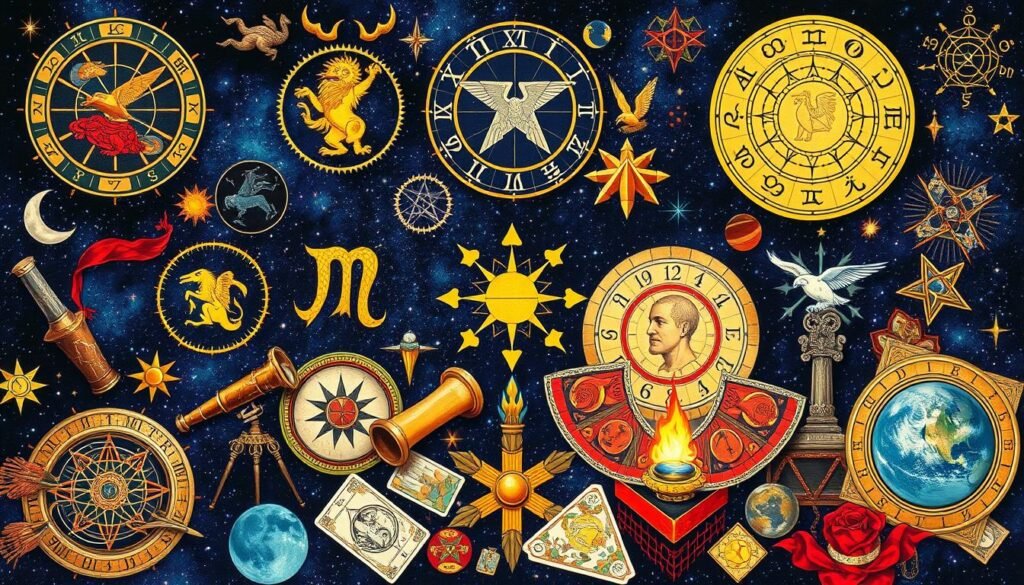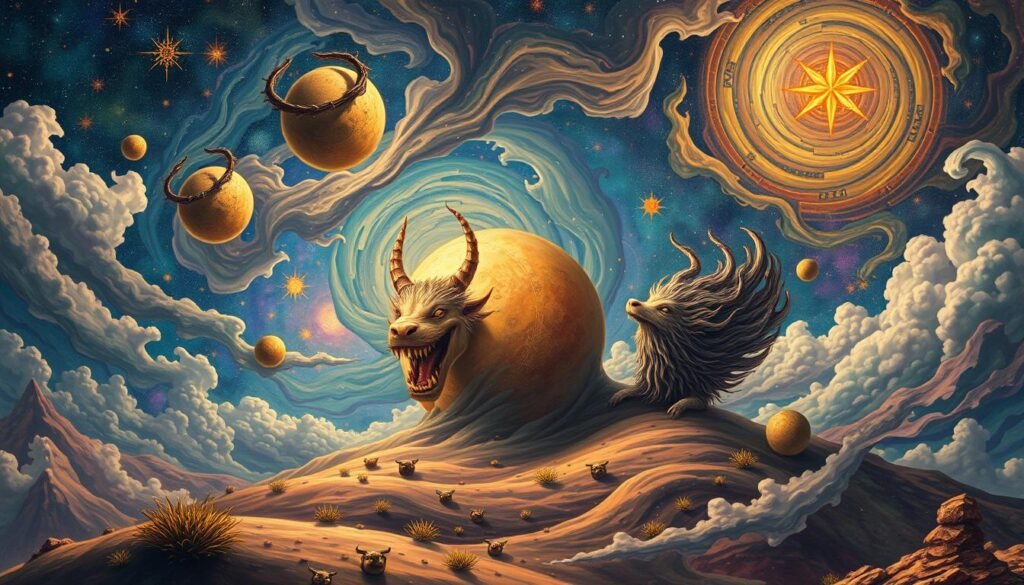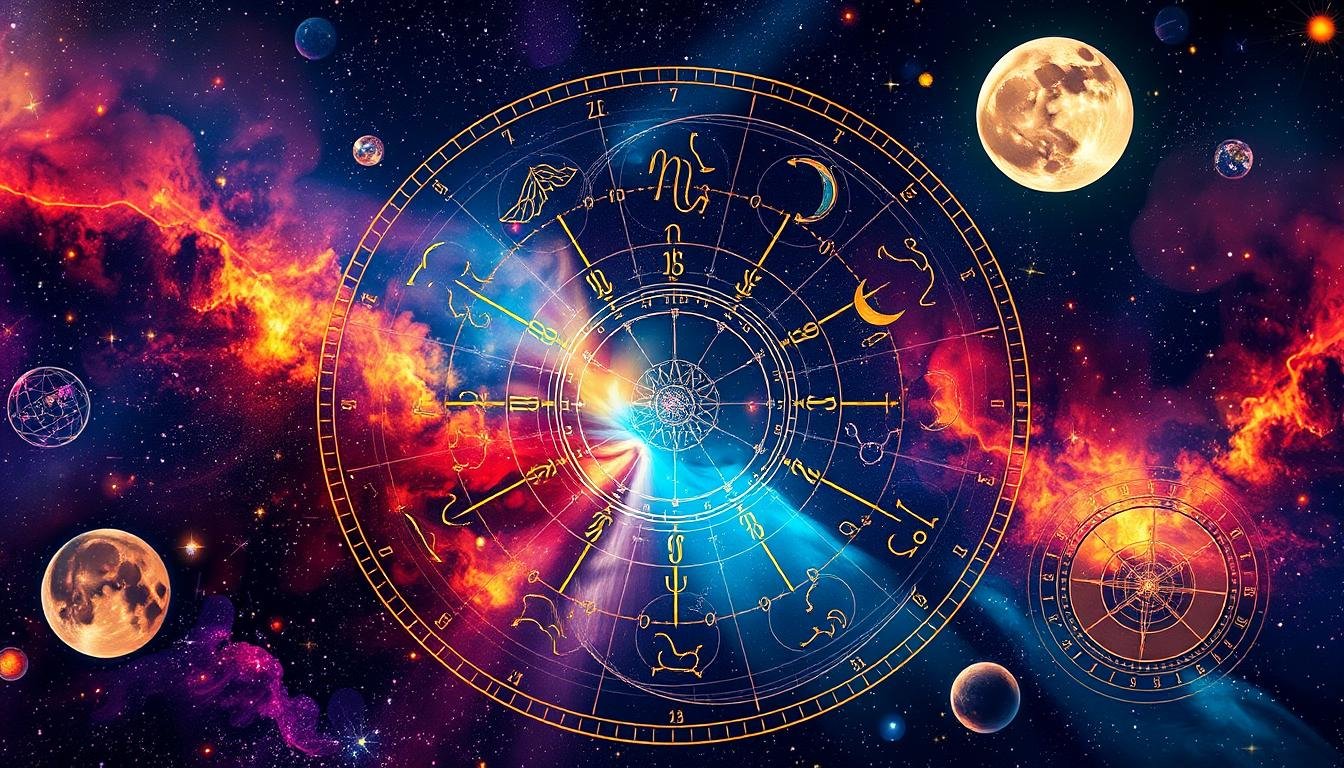Astrology has been fascinating people for thousands of years. It’s a study of how the stars and planets affect our lives. This guide will cover the basics of astrology, including the zodiac signs and how planets move. It will also show how astrology can help us understand ourselves, our relationships, and our choices.
Many people are now interested in astrology basics, like understanding the stars and reading horoscopes. This guide is for both astrology fans and newcomers. It aims to help you learn more about astrology and how it can help you grow and discover yourself.
Key Takeaways
- Astrology is an ancient practice that examines the celestial influences on our lives
- Understanding the zodiac signs and their corresponding elements is crucial in astrology
- Planetary movements and their impacts on our personalities and decision-making are central to astrological study
- Birth charts and natal astrology provide deep insights into an individual’s unique astrological profile
- Astrology can be a powerful tool for personal growth, self-discovery, and making informed life decisions
What is Astrology and How Does it Work?
Astrology is an ancient practice that looks at how the stars and planets affect us. Astrologers study the movements of these celestial bodies. They believe this helps understand our traits, life events, and what’s to come.
The Ancient Science of Celestial Bodies
The roots of astrology go back thousands of years. Early civilizations like the Babylonians, Egyptians, and Chinese studied the night sky. They thought the stars and planets were very important. Their work laid the groundwork for astrology today.
Core Principles of Astrological Study
- The zodiac: A circular path in the sky that the sun, moon, and planets appear to follow, divided into 12 signs, each with its own unique characteristics.
- Planetary positions: The location of the planets in the sky at the time of a person’s birth, which are believed to influence their personality and life events.
- Natal charts: A detailed map of the heavens at the time and place of a person’s birth, providing a blueprint for their astrological profile.
Modern Applications of Astrology
Today, astrology is more than just horoscopes in newspapers. It helps people grow, improve relationships, and make decisions. Astrology can also guide career choices, financial planning, and business strategies.
“The stars we are given. The constellations we make.”
– Rebecca Solnit
The History and Origins of Astrological Practice
The roots of ancient astrology go back to Babylon and Egypt. These early cultures were drawn to the stars and planets. They thought these celestial bodies were key to understanding human life.
Babylonian astrology was a major influence. The Babylonians used the stars and planets to predict the future and guide decisions.
Greek astrology built on Babylon’s work. The Greeks added their own philosophy to the mix. This helped shape Western astrology into what it is today.
| Ancient Civilizations | Astrological Contributions |
|---|---|
| Babylon | Developed complex systems of divination based on celestial observations |
| Egypt | Incorporated astrological beliefs into their religious and cultural traditions |
| Greece | Integrated Babylonian astronomical knowledge with philosophical concepts, further expanding astrological practices |
Many cultures have practiced astrology over time. Each brought their own views and ideas. Today, the study of the stars and their impact on us is still fascinating.
“The stars impel, they do not compel.” – Ptolemy, ancient Greek astronomer and astrologist
Understanding the Zodiac Signs and Their Elements
The zodiac is a deep system that shows the unique personalities of each sun sign. It ranges from the fiery fire signs to the solid earth signs. The elements shape an individual’s traits and actions.
Cardinal, Fixed, and Mutable Signs
The zodiac signs fall into three groups: cardinal, fixed, and mutable. Cardinal signs like Aries and Cancer start new things. Fixed signs, like Taurus and Leo, like things to stay the same. Mutable signs, such as Gemini and Pisces, are flexible and change easily.
Fire, Earth, Air, and Water Elements
- Fire signs (Aries, Leo, Sagittarius) are full of energy and ambition.
- Earth signs (Taurus, Virgo, Capricorn) are down-to-earth and dependable.
- Air signs (Gemini, Libra, Aquarius) are smart and love to talk.
- Water signs (Cancer, Scorpio, Pisces) are emotional and caring.
Personality Traits and Characteristics
The mix of zodiac signs and elements creates a rich mix of traits. For example, Aries is bold and always ready to start something new. On the other hand, Taurus is calm, practical, and loves the senses. Knowing about the zodiac signs helps us understand people better.
“The stars incline, they do not compel.” – Attributed to Galileo Galilei
Planetary Influences in Astrology
Astrology is a fascinating study that explores the connections between the stars and our lives. It looks at how the movements of planets affect us. By understanding the astrological planets, we can gain insights into our lives and the world.
The planetary movements and their aspects are studied by astrologers. They help us understand life’s many aspects, from personal growth to global events. Each celestial body has its own energy and character, influencing our experiences and personalities.
- The Sun, our core identity and vitality, is central in astrology.
- The Moon, with its changing phases, guides our emotions and intuition.
- Mercury, the messenger, affects our communication and decisions.
- Venus, the planet of love, shapes our relationships and values.
- Mars, the planet of action, fuels our drive and ambition.
- Jupiter, the expansive planet, brings us opportunities and growth.
- Saturn, the taskmaster, teaches us discipline and responsibility.
By studying planetary aspects, astrologers gain insights into our lives and relationships. This understanding helps us navigate our existence with awareness and purpose.
“The stars impel, they do not compel.” – Attributed to Ptolemy, the ancient Greek astronomer and astrologer
Exploring planetary influences reveals how the stars shape our experiences and guide our growth. This ancient wisdom empowers us to make informed choices and understand ourselves better. It helps us navigate life’s complexities with clarity and purpose.
Birth Charts and Natal Astrology Explained
Understanding your birth chart is key to astrological study. It’s a detailed map of the sky at your birth. It shows your personality, life path, and the cosmic forces that guide you.
Houses and Their Significance
The 12 astrological houses in your birth chart cover different life areas. These include relationships, finances, career, and personal growth. Knowing where planets sit in these houses helps understand your strengths and challenges.
Aspects and Planetary Positions
Planetary aspects are important in birth chart reading. They show the angles between celestial bodies. These angles reveal themes like tension, harmony, or balance in your life. Looking at the planets’ positions at your birth uncovers the energies that shape your experiences.
Reading Your Birth Chart
Exploring your birth chart is a journey of self-discovery. It helps you understand your unique strengths, talents, and life purpose. This knowledge empowers you to make better choices, face life’s challenges, and follow your true path.
Remember, birth charts offer valuable insights but don’t dictate your fate. Your chart is a guide, and your choices and actions shape your life’s journey.
Different Types of Astrological Systems
There are many traditions in astrology, each with its own way of seeing how the stars affect us. Western astrology, Vedic astrology from India, and Chinese astrology are just a few. They all give us different views and ways to understand the stars.
Western Astrology: A Timeless Tradition
Western astrology comes from ancient Greece and Rome. It’s known worldwide. It looks at the zodiac and how planets shape our lives and who we are.
Vedic Astrology: The Wisdom of the East
Vedic astrology, or Jyotish, comes from ancient India. It explores our spiritual and past life connections. It uses ancient texts and focuses on the moon and planets’ positions.
Chinese Astrology: The Harmony of the Elements
Chinese astrology is unique. It uses the five elements and the Chinese zodiac. It’s based on Taoism and the balance of yin and yang.
| Astrological Tradition | Key Characteristics | Cultural Significance |
|---|---|---|
| Western Astrology | Focuses on the zodiac and planetary influences | Widely practiced globally, with a strong presence in the Western world |
| Vedic Astrology | Emphasizes spiritual and karmic aspects, based on Vedic scriptures | Deeply rooted in the ancient wisdom of India |
| Chinese Astrology | Utilizes the five elements and the cyclical patterns of the Chinese zodiac | Closely tied to the principles of Taoism and the harmony of yin and yang |
These astrological traditions give us many ways to see how the stars influence us. Whether you’re interested in Western, Vedic, or Chinese astrology, exploring the stars can be deeply rewarding.

The Role of Astrology in Personal Growth
Astrology is more than just predicting the future or understanding the stars. It helps with self-discovery and personal growth. By exploring the stars’ wisdom, people can learn more about themselves and their life challenges.
Self-Discovery Through Astrology
Astrology offers deep insights into who we are. It reveals our personality, strengths, and weaknesses. This knowledge helps us understand our true selves and our emotional sides.
With astrological self-discovery, we can accept ourselves fully. We find our purpose and connect with our inner selves. This self-awareness empowers us, improves our choices, and enriches our lives.
Making Life Decisions with Astrological Guidance
Astrology helps us make better choices. It shows us the possible outcomes of our decisions. This is especially useful for big life choices, like career changes or relationships.
By using astrological guidance, we can make choices that match our desires and goals. This leads to a more meaningful life, less stress, and a fulfilling path.
In conclusion, astrology is more than just predicting the future. It’s a powerful tool for self-discovery, empowerment, and making informed choices. By embracing the stars’ wisdom, we can reach our full potential and navigate life’s complexities with confidence.
Common Misconceptions About Astrology
Astrology often sparks debate and skepticism. Some believe in its power, while others see it as pseudoscience. It’s important to understand the common misconceptions about astrology.
Many think astrology can predict the future with certainty. Astrology skeptics say these predictions lack scientific proof. But, many astrologists see it as a tool for self-understanding and growth, not future prediction.
Another myth is that astrology is a one-size-fits-all approach. In reality, each person’s birth chart is unique. It considers the sun, moon, and planets at birth. This makes each astrological profile special, showing a person’s strengths and challenges.
Some believe astrological signs define a person’s personality. While signs can offer insights, they don’t control a person’s actions. Scientific views say human behavior is shaped by many factors, not just astrology.

The debate on astrology’s validity will likely continue. By understanding misconceptions and evaluating evidence, people can decide astrology’s role in their lives.
| Misconception | Explanation |
|---|---|
| Astrology is a reliable predictor of the future | Astrological predictions lack scientific validity and are not supported by empirical evidence. |
| Astrology is a one-size-fits-all approach | Each person’s astrological profile is unique, reflecting their individual strengths, challenges, and life path. |
| Astrological signs determine a person’s personality and behavior | Human behavior is influenced by a complex interplay of genetic, environmental, and social factors, not just astrology. |
Conclusion
We hope you now see the value of astrology, the ancient study of the stars. This guide has covered the basics and the details of birth charts and how planets affect us. It shows how astrology can give us deep insights.
The astrology benefits are more than just predictions. They help us know ourselves better, grow, and feel connected to the universe. By using the astrological knowledge we’ve shared, you can start a journey of self-discovery. This will help you make choices with more confidence and clarity.
Remember, astrology is not a fixed solution for everyone. It’s a tool for personal empowerment. Explore your own astrological map. Let it help you understand yourself and your role in the universe.

